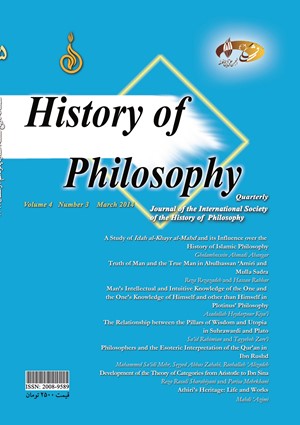Philosophers and the Esoteric Interpretation of the Qur’an in Ibn Rushd
Subject Areas : Etymology of philosophical terms
1 -
Keywords: Ibn Rushd religion philosophy esoteric interpretation truth ,
Abstract :
Like other Islamic philosophers, Abulwalid Muhammed Ibn Rushd, the most prominent philosopher of the West of the Islamic world thought about the relationship between religion and philosophy and created some important works in this regard. From among them, we can refer to Fasl al-maqal, al-kashf ‘an manahij al-adillah fi ‘aqa’id al-malah and Tahafut al-tahafat. In Ibn Rushd’s view, religion and philosophy are in harmony and bear no opposition against each other. In this regard, he argues, “Since Shari‘ah is the truth and invites people to a kind of rational reasoning which is fulfilled by the truth, both are the truth, and the truth is not in contrast to the truth. Rather, both agree with each other and acknowledge each other.” However, saying that philosophy is not in opposition to religion pertains to the innermost of religion and Qur’anic verses because philosophy and rational thinking are sometimes in contrast to the external meaning of religious ideas and verses. Ibn Rushd’s solution for removing such contrasts is to attain the inner meaning of the verses through interpretation. Of course, like Farabi, Ibn Rushd does not believe in the unity of religion and philosophy and merely thinks about their consistency with each other and lack of opposition between them. This is because philosophy and religion have to be independent from each other for the sake of their own safety. Thus we must not mix their related discussions with each other. In the present article, the writers have tackled the problem of the harmony between philosophy and religion from Ibn Rushd’s view in general, and explored his theory of interpretation, in particular. Finally, they argue that one of the most important goals of Ibn Rushd in propounding the discussion of the lack of opposition among religion, philosophy, and interpretation was defending philosophy and giving the right of interpretation to the people of reasoning, who are the same philosophers.
آيينهوند، صادق، دين و فلسفه از نگاه ابنرشد، با مروري به نظريه فيلسوفان مسلمان از کندي تا ابنرشد بر اساس تلفيق، استقلال و توفيق، تهران، نشر ني، 1385.
ابنرشد، تهافت التهافت، تحقيق سليمان دنيا، دارالمعارف مصر، ج2، 1965.م.
ابنرشد، فصل المقال، دراسة و تحقيق محمد عماره، المؤسسه العربيه للدراسات و النشر، بيروت، 1986.م. (ضميمه کتاب دين و فلسفه از نگاه ابنرشد، صادق آيينهوند، تهران، نشر ني، 1385).
ابنرشد، فصل المقال، اشراف الدکتور محمدعابد الجابري، بيروت، مرکز دراسات الوحدة العربيه، 2002.م.
ابنرشد، بداية المجتهد و نهاية المقتصد، قم، منشورات الرضي، 1370.
ابنرشد، الکشف عن مناهج الادله في عقائد المله، مع مدخل و مقدمه تحليليه، الدکتور محمد عابد الجابري، بيروت، مرکز دراسات الوحدة العربيه، 2001.م.
الاعسم کاظم زاهر، عبد الامير، ابنرشد و فلسفته بين التراث و المعاصره، بغداد، بيت الحکمه، ش34.
خراساني، شرفالدين، «ابنرشد ابواليد محمد بن احمد بن محمد»، دائرةالمعارف بزرگ اسلامي، زير نظر کاظم موسوي بجنوردي، تهران، ج3، 1374.
الخضيري، زينب محمد، اثر ابنرشد في فلسفه العصور الوسطي، قاهره، مکتبةالانجلو المصريه، بيتا.
ابراهيميديناني، غلامحسين، درخشش ابنرشد در حکمت مشاء، تهران، نشر علم، 1389.
صافحيان، محمد، «فلسفه و دين از ديدگاه ابنرشد»، فصلنامه معرفت، ش 42.
عابد الجابري، محمد، خوانشي نوين از فلسفه مغرب و اندلس، ترجمه سيدمحمد آلمهدي، تهران، نشر ثالث، 1391.
عابد الجابري، محمد، ابنرشد، سيره، فکر، مرکز دراسات الوحده العربيه، بيروت، 2001.م.
عابدي، احمد، «جاودانگي عالم در تعامل با خلقت از ديدگاه ابنرشد»، فصلنامه علمي ـ پژوهشي پژوهشهاي فلسفي ـ کلامي، س 7، ش 1.
عابدي، احمد، «مباني و ضوابط تأويل از ديدگاه ابنرشد»، فصلنامه پژوهشي انديشه نوين ديني، ش 3، زمستان 1384.
فؤاد الاهواني، احمد، «ابنرشد»، ترجمه غلامرضا اعواني، تاريخ فلسفه در اسلام، ج 1، م.م شريف، تهران، مرکز نشر دانشگاهي، 1362.
مدکور، ابراهيم، «فارابي»، ترجمه علي محمد کاردان، تاريخ فلسفه در اسلام، م.م شريف، ج 1، تهران، مرکز نشر دانشگاهي، 1362.
ملايري، موسي، «تفاوت جوهري نظريه فارابي و ابنرشد در تطبيق بين حکمت و شريعت»، قم، فصلنامه مفيد، ش 34.
ملایری، موسی، تبيين فلسفي وحي از فارابي تا ملاصدرا، قم، انتشارات طه، 1384.
مؤذن جامي، محمدهادي، «ابنرشد، ابواليد محمد بن احمد قرطبي»، دائرةالمعارف بزرگ اسلامي، زير نظر کاظم موسوي بجنوردي، تهران، ج3، 1374.
واعظي،اصغر، «حقيقت دوگانه (رابطه عقل و وحي از ديدگاه ابنرشد)»، خردنامه همشهري، ش 10، 1385.
داوري اردکاني، رضا، ما و تاريخ فلسفه اسلامي، تهران، پژوهشگاه فرهنگ و انديشه اسلامي، 1389.
داوري اردکاني، رضا، نگاهي ديگر به تاريخ فلسفه اسلامي، تهران، مؤسسه انتشارات دانشگاه تهران، 1387.
کربن، هانري، تاريخ فلسفه اسلامي، ترجمه سيدجواد طباطبايي، تهران، انتشارات کوير، 1387.
ملاصدرا، تفسير القرآن الکريم، ج1، تصحيح محمد خواجوي، قم، انتشارات بيدار، 1363.
ملاصدرا، رسائل فلسفي، تعليق و تصحيح سيدجلالالدين آشتياني، دانشگاه مشهد، 1392.
ملاصدرا، اسرار الآيات، ترجمه محمد خواجوي، تهران، مؤسسه مطالعات و تحقيقات فرهنگي، 1363.
Golb. N., “The Hebrew Translation of Averroes Fasl al-Magal”, Publication of Institute for the History of Arabic-Islamic Scienes, vol. 64, ed. Faut Sezgin, Germany, 1999.
Hourani, F. George, “Ibn-Rushd’s Defence of Philosophy”, Publications of Institute for the History of Arabic -Islamic Sciences, vol. 64, ed. Faut Sezgin, Germany, 1999.
Wolfson, Harry, “The Double Faith Theory in Clement, Saadia, Averroes and St. Thomas and it’s Origin in Aristotle and Stoices: Publications of Institute for the History of Arabic-Islamic Sciences, vol. 64, ed, Faut Sezgin, Germany, 1999.


